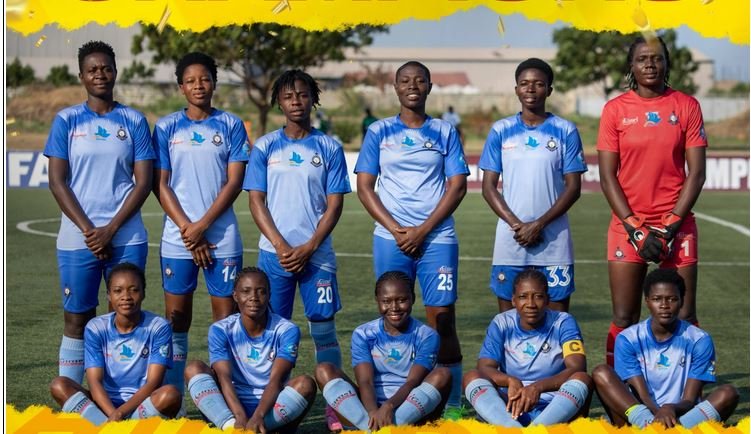Sports
Ayekoo, Police Ladies

Participation of Ghana’s security services in sports is seen more as a recreation or a creation for officers to be actively involved in play or physical exercise.
This reflects their absence on the honours boards of some of the major sports events, especially football.
But it is not so with other sports like athletics, boxing, handball, volleyball, basketball, mass sports and many others.
In these sports, they are dominated by players or athletes from the Ghana Armed Forces (GAF), comprising the Army, Air Force and Navy, the Ghana Police Service, Ghana Revenue Authority, previously referred to as the Customs Excise and Preventive Service, Ghana Immigration Service (GIS), Ghana National Fire Service (GNFS) and the Ghana Prisons Service (GPS).
Fact is, they have been credited with some of the major honours achieved in sports as a nation.
For instance, the Prisons service’s role in the career of the boxing professor, Azumah Nelson, has always been recognised as he started his career affiliated to the service.
GRA was considered a household name in the active days of basketball with years of dominance by the Brave’s team that stretched their dominance across Africa.
In volleyball and handball, Police, Fire and Prisons have created tensed and thrilling atmospheres that attracted hundreds of fans to the Prisons Sports Courts in Cantonment.
The Armed Forces have been strong in boxing and the marathons.
What is, however, making the services shy away from the honours list in football may perhaps be the belief that they may be in a disadvantaged position to keep pace with the professional clubs.
For the professionals, they eat and drink the game, but athletes or players with the services would have other duties to perform the moment they leave the field or their respective training venues.
Secondly, their conditions of service would not allow them to ‘poach’ or sign on players at exorbitant amounts. This means the services would find it difficult to attract good footballers to compete with the likes of Hearts’, Kotokos, Great Olympics and others.
However, the Police Ladies football team rendered this analogy gibberish over the weekend with a historic triumph in the Southern Zone of the Women’s Premier League (WPL).
After an 18-week run, the Police Ladies team that has campaigned under the shadows of top women club sides in the competition emerged from those dark shades, setting an enviable record other sister agencies would target to emulate.
The women in blue-and-white were crowned Southern Zone of the Malta Guinness Women’s Premier League champions, unseating the regular winners, Hasaacas Ladies.
It was a hard-fought victory for the police women and the joy that greeted the final whistle was incredible as they cartwheeled in unending joy to mark a feat never achieved in their history.
That was understandable because it came over Hasaacas Ladies, an experienced side that made marks in their maiden participation in the CAF Women’s Champions League competition.
However, going into the final game with 36 points, same as their opponents Hasaacas Ladies, the scale tilted in favour of Hasaacas Ladies.
But while the police women managed a 2-0 victory over FC Epiphany Warriors at the Adjiriganor Astro Turf in Accra, Hasaacas Ladies dropped two vital points after being held to a 1-1 draw encounter against Jonina Ladies.
Police Ladies, thus, finished the season with 11 wins, six draws, and one defeat, accruing 39 points would now face Northern Zonal Champions, Ampem Darkoa, in the playoff finale in May.
In congratulating Police Ladies, one would wish to present the feat as a challenge to the other security agencies to begin to focus on the business aspect of sports.
In some part of Africa, police teams feature regularly in their male elite leagues just as it remain a common feature in the francophone regions where Douanes (Customs teams) feature in their elite competition.
Sadly in Ghana, no team, as of now, from any of the security agencies have come close to even the national Division One League (DOL), indicating a very low desire to recruit very good players to make them competitive.
But reaching the very top in sports is not something beyond them. The feat by Police Ladies clearly shows that when the recruits are groomed well, they can become top professionals and compete at the highest level.
Maybe in their future recruitment, they can place special emphasis on signing people with special talents to give them competitive advantage. That will also put their players who are not staff of the service the chance to be considered.
As we wait to hear when any of the security agencies would sell their first player, we say a big ‘ayekoo’ to the Police Ladies team for doing a yeoman’s job.
By Andrew Nortey